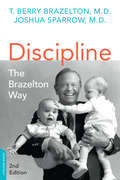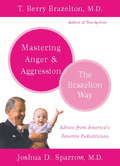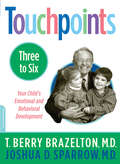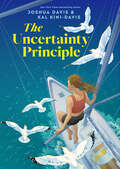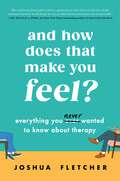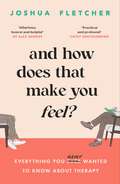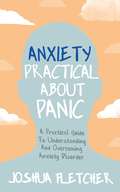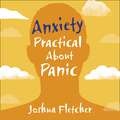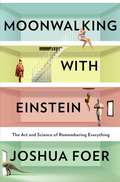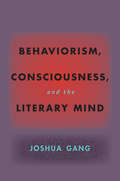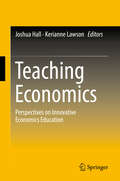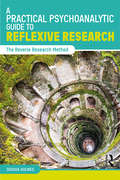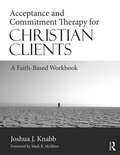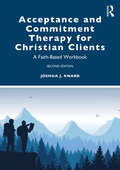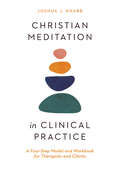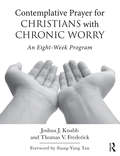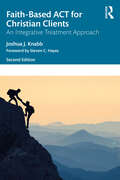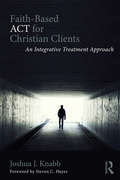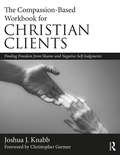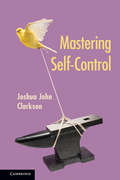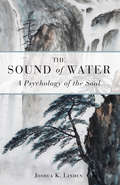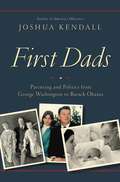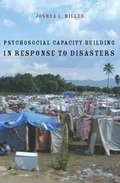- Table View
- List View
Discipline: The Brazelton Way, Second Edition (A Merloyd Lawrence Book)
by T. Berry Brazelton Joshua D. SparrowWorld renowned pediatricians T. Berry Brazelton and Joshua Sparrow see discipline as a parent’s gift to a child. By following the doctors’ unique approach, which emphasizes teaching over punishment, parents will find effective solutions for common behavior problems. Not only will parents feel more confident and at ease but they will also experience the joy of raising children who learn to discipline themselves. The vital advice covers six stages of discipline, the power of consequences, ways to encourage moral development and empathy, dealing with misbehavior (from biting and fighting to cheating, lying and using foul language), and special disciplinary challenges (including academic pressure, illness, and digital technology).
Mastering Anger and Aggression - The Brazelton Way
by T. Berry Brazelton Joshua D. SparrowHow to react when your toddler bites his playmate or your kindergartner confronts a bully? Drs. Brazelton and Sparrow bring their much-admired insight and support to this crucial, and ever more timely, childrearing challenge. From an early age, babies and toddlers need to assert themselves in a daunting world, yet eventually learn to do this without hurting others. After showing how aggression emerges at each age, Brazelton and Sparrow offer practical, wise advice on anger, fights, self-defense, the fears and nightmares that arise when children become aware of their own and others' aggression, the effects of TV and video games, and of experiencing real life violence. They offer specific, effective ways to help children understand their own aggressive feelings and channel them into healthy self-assertion in schoolwork, games, and sports.
Touchpoints Three to Six
by T. Berry Brazelton Joshua D. SparrowFor decades, new parents have relied on Dr. Brazelton's wisdom. But all "Brazelton babies" grow up. Now at last, the internationally famous pediatrician, in collaboration with an eminent child psychiatrist, has brought his unique insights to the "magic" preschool and first-grade years. Through delightful profiles of four very different children, the authors apply the touchpoints theory (following the pattern of growth-new challenge-reegression-recharging-and renewed growth) to each of the great cognitive, behavioral, and emotional leaps that occur from age three to six. In the second, alphabetical, half of the book they offer precious guidance to parents facing contemporary pressures and stresses, such as how to keep a child safe without instilling fear, countering the electronic barrage of violent games and marketing aimed at children, coping successfully with varied family configurations, over-scheduling, competition, and many other vital issues today. A Merloyd Lawrence Book
Understanding Sibling Rivalry: The Brazelton Way
by T. Berry Brazelton Joshua D. SparrowThe teasing, squabbling, competition, and ferocious fights of brothers and sisters can drive any parent to frantic desperation. At the same time, Drs. Brazelton and Sparrow point out, siblings are learning from one another and deep, close relationships are forming that will last a lifetime. In this absolutely indispensable addition to the Brazelton Way series, the authors show how parents can defuse much of the bickering, while helping to strengthen warm relationships. They help parents understand the universal "Touchpoints” of sibling rivalry at each age, as well as the problems in particular family situations. From the combined delight and resentment that a sibling feels toward a new baby, to birth order, blended families, sex play, scapegoats, meltdowns, and competition in school, parents will find welcome advice in this wise, comforting book.
The Uncertainty Principle
by Joshua Davis Kal Kini-DavisAn epic, breathtaking story of self-discovery, love, and adventure from New York Times bestselling author Joshua Davis and his son Kal Kini-Davis, perfect for fans of Nina LaCour and John Green.Seventeen-year-old Mia is stranded in the middle of the Caribbean. After a mortifying incident in the school cafeteria, her parents decide there is only one way to deal with her meltdown: move onto a battered sailboat and leave everything behind. Her mom and dad think it&’s the best decision they&’ve ever made. Mia feels like she&’s been kidnapped and imprisoned in paradise with no internet and no destination.Her only hope is to hack together a solar-powered satellite phone so she can call her best friend and fix everything. To do it, she&’ll have to build a mobile laboratory on the boat and ignore her neurotic mother, who thinks Mia is falling apart.The problem is, Mia is falling apart. By day, she scours deserted islands, looking for anything she can use to build the phone. At night, she squeezes into a narrow bunk and talks to an imaginary friend. She knows, with absolute certainty, that she needs to abandon her family to save her sanity.And then two teenagers sail into her world, promising friendship, and maybe even romance. Thoughtful, soulful Alby was raised in Australia but now his family calls the sea their home. The only thing missing is his soulmate. Bold, beautiful Nisha is simply vacationing on her dad&’s megayacht when a chance encounter upends her life.Now—with everything hanging in the balance—Mia must decide who she is and what she wants. And with this decision comes the revelation that her past and future are more uncertain than she thought.
And How Does That Make You Feel?: Everything You (N)ever Wanted to Know About Therapy
by Joshua FletcherPsychotherapist Josh Fletcher takes us on a tour of the inner mind of a therapist—revealing a hilariously candid point of view on the therapeutic process, a practical guide to therapy, and maybe a few more cobwebs and dark corners than one might expect. It’s everything you ever wanted to know about therapy (and maybe a few things you didn’t). Trauma, heartbreak, anxiety, and mourning are all parts of the human experience, and Josh Fletcher’s mission in life is to normalize the need to find a trusted professional with whom you can discuss all of life’s scariest aspects. Through the lens of four of his patients—Daphne, a wildly successful actor who still struggles to find contentment; Levi, an intimidating bouncer with obsessive tendencies who’s trapped in a sex cult; Zahra, an anxious, people-pleasing doctor in the midst of unpacking serious trauma; and Noah, a shy newcomer with some major closet skeletons—you’ll share in their self-discovery and recovery as they untangle themselves from an all-too-familiar web of emotions. In between sessions, Fletcher struggles to balance his own well-being with that of his patients as details from his sometimes messy but always heartfelt personal life reveal that therapists aren’t immune to getting tripped up by the same hurdles as the rest of us. And How Does That Make You Feel? is a primer on what to expect from therapy, how to find the right therapist, and the most common afflictions treated in therapy (such as depression, OCD, and panic attacks) as well as a darkly hilarious narrative about what’s going on in your therapist’s mind before, during, and after your session. Above all, it’s filled with the promise that a better future is always possible . . . if we’re willing to seek help and do the work.
And How Does That Make You Feel?: everything you (n)ever wanted to know about therapy
by Joshua FletcherExtraordinary. The psychology world has found its own Adam Kay. Dr Sophie Mort, clinical psychologist & Sunday Times bestselling author of A Manual for Being HumanHave you ever wondered what goes on behind the closed door of the therapist's office? What's revealed there may surprise you.Psychotherapist Josh Fletcher takes us on a candid and human journey into the individual sessions of four patients - Levi, Zahra, Noah and Daphne - sharing their self-discovery and recovery as they engage in therapy for the first time. And he lets us into the inner thoughts of a therapist, from shock and sympathy while in session, to how it feels to run into a former client on a messy night out. Interspersed with straight-talking advice on common issues such as anxiety, OCD and panic attacks, as well as a therapist's guide to how to find the right therapist, And How Does That Make You Feel? is darkly funny, illuminating and full of promise that a better future is always possible.It's everything you wanted to know about therapy (and quite a few things you probably didn't).Hilarious, honest and helpful. Dr Alex George, Sunday Times bestselling author of The Mind ManualRaw and honest. It will change the way you think about and treat your own mental health. Dr Nicole LePera, New York Times number one bestselling author of How to Do the WorkAn amazing and important book. Practical, profound, entertaining and enlightening. Cathy Rentzenbrink, Sunday Times bestselling author of The Last Act of Love
Anxiety: A Practical Guide to Understanding and Overcoming Anxiety Disorder
by Joshua FletcherDo you suffer from anxiety and panic? So did Joshua Fletcher, the author of the self-published bestseller ANXIETY: PANICKING ABOUT PANIC - but he treated his own condition successfully, went back to school, became a counsellor and emerged as one of the country's leading experts. ANXIETY: PRACTICAL ABOUT PANIC is a complete, easy to read and hugely practical book about anxiety from someone who knows how to recover and live your life to the full - and will show you how. Concentrating on the actions that you can take to alleviate and overcome your worries, this book is all about you and what you need to do to improve your life.
Anxiety: A Practical Guide to Understanding and Overcoming Anxiety Disorder
by Joshua FletcherDo you suffer from anxiety and panic? So did Joshua Fletcher, the author of the self-published bestseller ANXIETY: PANICKING ABOUT PANIC - but he treated his own condition successfully, went back to school, became a counsellor and emerged as one of the country's leading experts. ANXIETY: PRACTICAL ABOUT PANIC is a complete, easy to read and hugely practical book about anxiety from someone who knows how to recover and live your life to the full - and will show you how. Concentrating on the actions that you can take to alleviate and overcome your worries, this book is all about you and what you need to do to improve your life.
Anxiety: A Practical Guide to Understanding and Overcoming Anxiety Disorder
by Joshua FletcherDo you suffer from anxiety and panic? So did Joshua Fletcher, the author of the self-published bestseller ANXIETY: PANICKING ABOUT PANIC - but he treated his own condition successfully, went back to school, became a counsellor and emerged as one of the country's leading experts. ANXIETY: PRACTICAL ABOUT PANIC is a complete, easy to read and hugely practical book about anxiety from someone who knows how to recover and live your life to the full - and will show you how. Concentrating on the actions that you can take to alleviate and overcome your worries, this book is all about you and what you need to do to improve your life.(P) 2019 Hodder & Stoughton Ltd
Moonwalking with Einstein: The Art and Science of Remembering Everything
by Joshua FoerThis book draws on cutting-edge research, a surprising cultural history of memory, and venerable tricks of the mentalist's trade to transform our understanding of human remembering. Moonwalking with Einstein brings Joshua Foer to the apex of the U.S. Memory Championship and readers to a profound appreciation of a gift we all possess but that too often slips our minds.
Behaviorism, Consciousness, and the Literary Mind (Hopkins Studies in Modernism)
by Joshua GangWhat might behaviorism, that debunked school of psychology, tell us about literature?If inanimate objects such as novels or poems have no mental properties of their own, then why do we talk about them as if they do? Why do we perceive the minds of characters, narrators, and speakers as if they were comparable to our own? In Behaviorism, Consciousness, and the Literary Mind, Joshua Gang offers a radical new approach to these questions, which are among the most challenging philosophical problems faced by literary study today.Recent cognitive criticism has tried to answer these questions by looking for similarities and analogies between literary form and the processes of the brain. In contrast, Gang turns to one of the twentieth century's most infamous psychological doctrines: behaviorism. Beginning in 1913, a range of psychologists and philosophers—including John B. Watson, B. F. Skinner, and Gilbert Ryle—argued that many of the things we talk about as mental phenomena aren't at all interior but rather misunderstood behaviors and physiological processes. Today, behaviorism has relatively little scientific value, but Gang argues for its enormous critical value for thinking about why language is so good at creating illusions of mental life.Turning to behaviorism's own literary history, Gang offers the first sustained examination of the outmoded science's place in twentieth-century literature and criticism. Through innovative readings of figures such as I. A. Richards, the American New Critics, Samuel Beckett, Harold Pinter, and J. M. Coetzee, Behaviorism, Consciousness, and the Literary Mind reveals important convergences between modernist writers, experimental psychology, and analytic philosophy of mind—while also giving readers a new framework for thinking about some of literature's most fundamental and exciting questions.
Teaching Economics: Perspectives on Innovative Economics Education
by Joshua Hall Kerianne LawsonThis book looks at a number of topics in economic education, presenting multiple perspectives from those in the field to anyone interested in teaching economics. Using anecdotes, classroom experiments and surveys, the contributing authors show that, with some different or new techniques, teaching economics can be more engaging for students and help them better retain what they learned. Chapters cover a wide range of approaches to teaching economics, from interactive approaches such as utilizing video games and Econ Beats, to more rigorous examinations of government policies, market outcomes and exploring case studies from specific courses. Many of the chapters incorporate game theory and provide worked out examples of games designed to help students with intuitive retention of the material, and these games can be replicated in any economics classroom. While the exercises are geared towards college-level economics students, instructors can draw inspiration for course lectures from the various approaches taken here and utilize them at any level of teaching. This book will be very useful to instructors in economics interested in bringing innovative teaching methods into the classroom.
A Practical Psychoanalytic Guide to Reflexive Research: The Reverie Research Method
by Joshua HolmesA Practical Psychoanalytic Guide to Reflexive Research offers an accessible guide to enriched qualitative research. In this novel approach, the researcher’s feelings and empathy in relation to participants take centre stage, leading to fresh, exciting and usable research findings. The psychoanalytic concept of reverie refers to those startling and unexpected images, feelings and daydreams which can come to mind as we interact with other people in the world. Qualitative research involves interacting with human subjects, and the book shows how uncanny or troubling reverie experiences can be turned to good use by being linked back to deeper research questions and hypotheses.Joshua Holmes critically explores the role of self-reflection (reflexivity) in psychoanalysis and qualitative research. Practical guidance is offered while planning research; conducting research interviews; analysing interview data; teaching methods which foster the capacity for reverie; and in relation to research groups. Examples are given throughout, including the author’s own missteps along the way, in which he shares the importance of learning from experience. The book breathes life into research processes offering much-needed clinical relevance. The method moves away from one-size-fits all, formulaic research procedures and brings tenor, colour and texture into the research process, to create vivid, real-life meaningful findings.A Practical Psychoanalytic Guide to Reflexive Research will be essential reading for undergraduate and postgraduate qualitative researchers wishing to enhance their reflexive practice, while psychotherapists and psychoanalysts will find a genuinely psychoanalytic research method, where their clinical skills become vital capacities rather than an awkward hindrance.
Acceptance and Commitment Therapy for Christian Clients: A Faith-Based Workbook
by Joshua J. KnabbAcceptance and Commitment Therapy for Christian Clients is an indispensable companion to Faith-Based ACT for Christian Clients. The workbook offers a basic overview of the goals of ACT, including concepts that overlap with Christianity. Chapters devoted to each of the six ACT processes include biblical examples, equivalent concepts from the writings of early desert Christians, worksheets for clients to better understand and apply the material, and strategies for clients to integrate a Christian worldview with the ACT-based processes. Each chapter also includes several exercises devoted to contemplative prayer and other psychospiritual interventions.
Acceptance and Commitment Therapy for Christian Clients: A Faith-Based Workbook
by Joshua J. KnabbAcceptance and Commitment Therapy for Christian Clients: A Faith-Based Workbook, Second Edition, is an indispensable companion for mental health professionals and their clients. The new edition includes updated discussions in each chapter and more than twenty-five new and updated exercises. The workbook offers a basic overview of the goals of ACT, including concepts that overlap with Christianity. Chapters devoted to each of the six ACT processes include biblical examples, equivalent concepts from the writings of contemplative Christians, worksheets for clients to better understand and apply the material, and strategies for clients to integrate a Christian worldview with ACT processes. Each chapter also includes several exercises devoted to contemplative practices and other psychospiritual interventions.
Christian Meditation in Clinical Practice: A Four-Step Model and Workbook for Therapists and Clients (Christian Association for Psychological Studies Books)
by Joshua J. Knabban introduction to the rich resources on meditation from eight major streams of the Christian traditionpractices from the early desert Christians, Ignatius of Loyola, Celtic Christians, the Puritans, contemporary writers, and many othersguidance for targeting transdiagnostic processes—patterns of cognition, affect, behavior, the self, and relationships that may lead to psychological sufferingresearch-based evidence for the benefits of Christian meditationclient-friendly tools for practicing meditation, including step-by-step instructions, worksheets, journaling prompts, and links to tailored audio resources
Contemplative Prayer for Christians with Chronic Worry: An Eight-Week Program
by Joshua J. Knabb Thomas V. FrederickContemplative Prayer for Christians with Chronic Worry presents an eight-week approach for working with recurrent worry. Each chapter offers an introduction for the week, goals, techniques, and homework. Six free audio recordings are also available to download for use when practicing the guided meditations. Clinicians and their clients will find that the workbook helps them explore ways to lessen daily worries through contemplative prayer. Relying on scriptural support, the contemplative Christian tradition, and psychological science, clients will learn how to sit in silence with God, trusting in him during moments of uncertainty, worry, and anxiety.
Faith-Based ACT for Christian Clients: An Integrative Treatment Approach
by Joshua J. KnabbFaith-Based ACT for Christian Clients balances empirical evidence with theology to give mental health professionals a deep understanding of both the "why" and "how" of acceptance and commitment therapy (ACT) for Christians. The new edition includes updated discussions in each chapter, more than 20 new and updated exercises, and new chapters on couples and trauma. The book includes a detailed exploration of the overlap between ACT and the Christian faith, case studies, and techniques that are explicitly designed to be accessible to both non-Christian and Christian (including evangelical Christian) counselors and therapists. Chapters also present the established research on Buddhist-influenced mindfulness meditation and newer research on Christian-derived meditative and contemplative practices and lay a firm theological foundation through the use of engaging biblical stories and metaphors.
Faith-Based ACT for Christian Clients: An Integrative Treatment Approach
by Joshua J. KnabbFaith-Based ACT for Christian Clients balances empirical evidence with theology to give clinicians a deep understanding of not just the "why" but also the "how" of Acceptance and Commitment Therapy for Christian clients. Chapters include a detailed exploration of the overlap between ACT and the Christian faith, case studies, and techniques that are explicitly designed to be accessible to non-Christian as well as Christian (including evangelical Christian) counselors and therapists. Chapters present the established research on mindfulness and ACT, including a nuanced, non-dichotomous view of complex issues such as medication, and lay a firm theological foundation through the use of engaging biblical stories and metaphors.
The Compassion-Based Workbook for Christian Clients: Finding Freedom from Shame and Negative Self-Judgments
by Joshua J. KnabbThe Compassion-Based Workbook for Christian Clients integrates contemporary research in clinical psychology on compassion-based approaches to shame with a Christian worldview, offering a wide variety of strategies for Christians to better understand and combat shame and negative self-judgments. Chapters lay out a four-step process to help clients let go of unhelpful thinking patterns that lead to shame, experience God’s compassion on a deeper level, and extend this compassion to themselves and others. Readers will find a wealth of Christian-sensitive experiential exercises, journaling assignments, biblical examples, and case examples throughout the workbook. Audio recordings for several guided meditations are also provided to help Christians practice the strategies offered in the workbook.
Mastering Self-Control
by Joshua John ClarksonGrounded in nearly a century of scientific research, Mastering Self Control is an academic 'how to' in the mastery of self control. Though most of us have an acute awareness of the goals we want to achieve, we have little insight into how we respond to questions central to successful goal attainment. What is a realistic goal? Can we turn intentions to actions? Why do we need a support system? It is within this context that this volume identifies a series of actionable strategies to push readers to master self-control and consequently optimize goal progress.
The Sound of Water
by Joshua K. LindenAfter a lifetime of living, Joshua K. Linden heard the sound of water in a whole new way. The mesmerizing, meditative sound resonated so deeply within his soul that it propelled him on a seven year journey of reflection: on soul, ego, and our place within the web of life. What he has discovered during his journey is suffering is a result of the battle between the ego and the Soul. The ego wants to plan and create a future whereas the Soul needs to express itself in the present. If one is truthful, eventually one awakens to the fact that the body will die, and that the future in this dimension is limited. The Sound of Water leads readers to understand it is in their best interest to shed the ego and to live life with the Soul that is eternal. Linden's book points you in the direction of this Source. This is where your essence and the essence of all things flow into one another--without deception, distortion, or corruption. Beautifully designed, The Sound of Water offers a series of thoughts and meditations that will guide you in your own journey to reconnect with the Source. You are invited to read it from beginning to end, or flip to a page at random to find deep insight and wisdom; inspiring you to awaken to living a life that deeply honors and values the Soul.
First Dads: Parenting and Politics from George Washington to Barack Obama
by Joshua KendallEvery president has had some experience as a parent. Of the 43 men who have served in the nation's highest office, 38 have fathered biological children and the other five adopted children. Each president's parenting style reveals much about his beliefs as well as his psychological make-up. James Garfield enjoyed jumping on the bed with his kids. FDR's children, on the other hand, had to make appointments to talk to him. In a lively narrative, based on research in archives around the country, Kendall shows presidential character in action. Readers will learn which type of parent might be best suited to leading the American people and, finally, how the fathering experiences of our presidents have forever changed the course of American history.
Psychosocial Capacity Building in Response to Disasters
by Miller Joshua L.Disaster responders treat more than just the immediate emotional and psychological trauma of victims: they empower individuals and families to heal themselves long into a disaster's aftermath. This requires helping survivors to rebuild their ability to meet their emotional and psychological needs, not only for themselves but also for others, which necessitates a careful consideration of survivors' social, economic, and political realities as their communities heal and recover. This comprehensive book integrates Western mental health approaches and international models of psychosocial capacity building within a social ecology framework, providing practitioners and volunteers with a blueprint for individual, family, group, and community interventions. Joshua L. Miller focuses on a range of disasters at local, regional, national, and international levels. Global case studies explore the social, psychological, economic, political, and cultural issues affecting various reactions to disaster and illustrate the importance of drawing on local cultural practices to promote empowerment and resiliency. Miller encourages developing people's capacity to direct their own recovery, using a social ecology framework to conceptualize disasters and their consequences. He also considers sources of vulnerability and how to support individual, family, and community resiliency; adapt and implement traditional disaster mental health interventions in different contexts; use groups and activities to facilitate recovery as part of a larger strategy of psychosocial capacity building; and foster collective grieving and memorializing. Miller's text examines the unique dynamics of intergroup conflict and the relationship between psychosocial healing, social justice, and peace and reconciliation. Each chapter ends with a mindfulness exercise, and a section reviews practitioner self-care.
